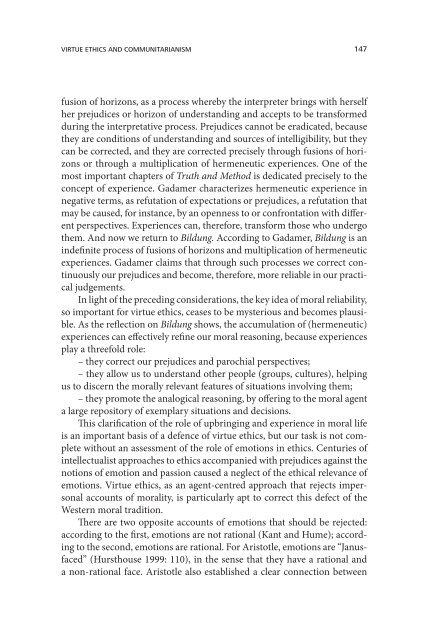Diacritica 25-2_Filosofia.indb - cehum - Universidade do Minho
Diacritica 25-2_Filosofia.indb - cehum - Universidade do Minho
Diacritica 25-2_Filosofia.indb - cehum - Universidade do Minho
You also want an ePaper? Increase the reach of your titles
YUMPU automatically turns print PDFs into web optimized ePapers that Google loves.
VIRTUE ETHICS AND COMMUNITARIANISM<br />
147<br />
fusion of horizons, as a process whereby the interpreter brings with herself<br />
her prejudices or horizon of understanding and accepts to be transformed<br />
during the interpretative process. Prejudices cannot be eradicated, because<br />
they are conditions of understanding and sources of intelligibility, but they<br />
can be corrected, and they are corrected precisely through fusions of horizons<br />
or through a multiplication of hermeneutic experiences. One of the<br />
most important chapters of Truth and Method is dedicated precisely to the<br />
concept of experience. Gadamer characterizes hermeneutic experience in<br />
negative terms, as refutation of expectations or prejudices, a refutation that<br />
may be caused, for instance, by an openness to or confrontation with diff erent<br />
perspectives. Experiences can, therefore, transform those who undergo<br />
them. And now we return to Bildung. According to Gadamer, Bildung is an<br />
indefi nite process of fusions of horizons and multiplication of hermeneutic<br />
experiences. Gadamer claims that through such processes we correct continuously<br />
our prejudices and become, therefore, more reliable in our practical<br />
judgements.<br />
In light of the preceding considerations, the key idea of moral reliability,<br />
so important for virtue ethics, ceases to be mysterious and becomes plausible.<br />
As the refl ection on Bildung shows, the accumulation of (hermeneutic)<br />
experiences can eff ectively refi ne our moral reasoning, because experiences<br />
play a threefold role:<br />
– they correct our prejudices and parochial perspectives;<br />
– they allow us to understand other people (groups, cultures), helping<br />
us to discern the morally relevant features of situations involving them;<br />
– they promote the analogical reasoning, by off ering to the moral agent<br />
a large repository of exemplary situations and decisions.<br />
Th is clarifi cation of the role of upbringing and experience in moral life<br />
is an important basis of a defence of virtue ethics, but our task is not complete<br />
without an assessment of the role of emotions in ethics. Centuries of<br />
intellectualist approaches to ethics accompanied with prejudices against the<br />
notions of emotion and passion caused a neglect of the ethical relevance of<br />
emotions. Virtue ethics, as an agent-centred approach that rejects impersonal<br />
accounts of morality, is particularly apt to correct this defect of the<br />
Western moral tradition.<br />
Th ere are two opposite accounts of emotions that should be rejected:<br />
according to the fi rst, emotions are not rational (Kant and Hume); according<br />
to the second, emotions are rational. For Aristotle, emotions are “Janusfaced”<br />
(Hursthouse 1999: 110), in the sense that they have a rational and<br />
a non-rational face. Aristotle also established a clear connection between<br />
<strong>Diacritica</strong> <strong>25</strong>-2_<strong>Filosofia</strong>.<strong>indb</strong> 147 05-01-2012 09:38:26











![Programa [pdf] - cehum - Universidade do Minho](https://img.yumpu.com/17305425/1/190x135/programa-pdf-cehum-universidade-do-minho.jpg?quality=85)




